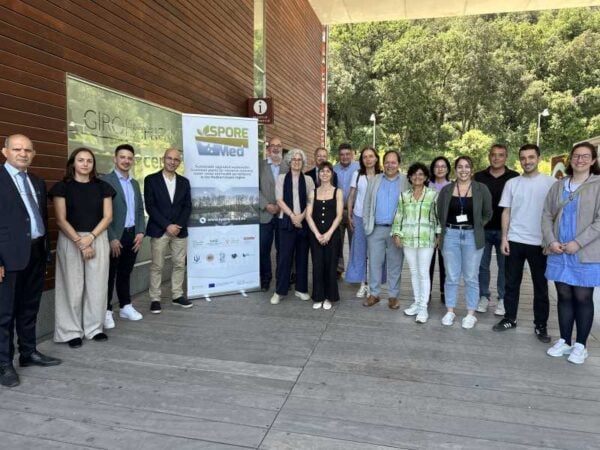New project to make wastewater treatment plants in the Mediterranean more efficient and sustainable
The SPORE-MED project, coordinated by the Laboratory of Chemical and Environmental Engineering (LEQUIA) of the University of Girona (UdG), aims to upgrade urban wastewater treatment plants. Sostenipra group from ICTA-UAB will evaluate the environmental and economic impacts and benefits of the proposed upgrades. The project, which will be executed over three years, brings together seven universities and two large enterprises from Spain, Italy, Greece, Cyprus, Morocco and Tunis.

Urban wastewater treatment plants are hydric infrastructures to treat the water we use and return it to the environment in the best conditions. During the past few years, wastewater treatment plants are also turning into a source of resources – such as reclaimed water or nutrients – and a key element for wastewater-based surveillance. However, these facilities are still major energy consumers and are not capable of removing certain pollutants. With a budget of 3,67M€ -of which, 3,5 funded by PRIMA Foundation-, the SPORE-MED project has the goal of upgrading current wastewater treatment plants to respond to these and other challenges within the water-energy-food-health nexus in the Mediterranean region, more vulnerable to climate change and water scarcity that the world average.
During three years, four pilot plants will be constructed and installed in wastewater treatment plants of the participant countries to evaluate innovative treatment processes and monitoring systems that are not yet commercially available. The company GS INIMA Environment will validate a high-rate activated sludge system treatment with low energy consumption; the University of Girona and the University of Sfax (Tunis), the recovery of nutrients as struvite to manufacture fertilizers; the University of Salerno (Italy) and the Technical University of Crete (Greece), the removal of micro-plastics and other micro-pollutants using membranes; and the University of Sfax, a sensor to increase the detection rate of SARS-CoV-2 virus.
Beyond the upgrade and sustainability of sanitation systems, the project will also contribute to gathering new products and services within agricultural and healthcare services. The Polytechnic University Mohamed VI (Morocco) will evaluate the agronomic value of the fertilizers obtained and the irrigation with treated water, and UdG will assess the effect of such agro-practices in soil microbiology. Within the healthcare system, the University of Cyprus will set up a new system to monitor the SARS-CoV-2 virus and antimicrobial resistance in the region of Nicosia.
Sostenipra group from ICTA-UAB will evaluate the environmental and economic impacts of these technologies, products and services taking into account their entire life cycle. In addition, the University of Girona will study its social acceptance; and the University of Cyprus will conduct a risk analysis of treated water reuse for agricultural irrigation. Altogether, this will seek to transfer the project results to the society by means of the exploitation undertaken by the two participant enterprises, the license of the validated technologies to external entities, or the foundation of university spinoff companies.
The Kick-Off Meeting
Twenty project participants attended the project Kick-Off Meeting, held on 5th and 6th of June at the University of Girona Research and Innovation Park. The UdG Vice-rector of Research, Maria Pla, welcomed the attendants, who planned the actions to be carried out during the first year. The programme also included a field trip to La Garriga wastewater treatment plant (in the province of Barcelona), where the participants could visit a small-scale pilot plant of one of the innovative treatment processes that will be validated within the project.